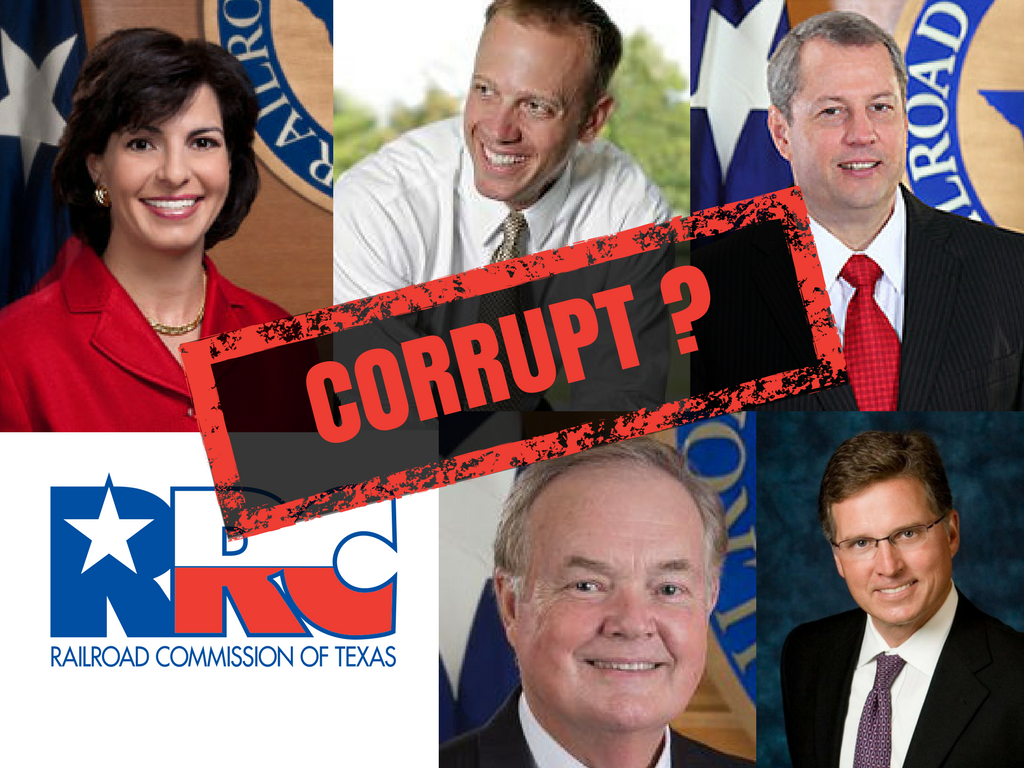
A new study finds Texas Railroad Commissioners took tens of thousands of dollars from energy interests with cases pending before their agency in recent years, contradicting Texas Sunset Commission testimony in 2012 that claimed that the commissioners “self-police” themselves against such conflicts.
The report is incredibly timely as it comes days before the Texas House is scheduled to tackle the Railroad Commission Sunset bill (HB 1818) to extend the agency until 2029. In fact, several bills have been filed in addition to this one that attempt to reform this captured agency, one of which is Rep. Anchia's HB 464 which would prohibit parties to agency cases from contributing to commissioners from the date a contested hearing is announced until 30 days after it is decided.
The explosive 19-page study by the Sierra Club, Public Citizen, and Texans for Public Justice tracks eight important agency cases dating back to 2010. The report traces hundreds of thousands of dollars associated with those pending cases to winning Railroad Commission candidates as well as to sitting Railroad Commissioners. The money in question came from PACs, executives, and an outside law firm involved in six gas-utility rate cases and two injection-well earthquake cases.
In late 2012, for example, then-Commissioner Barry Smitherman collected $11,000 from Atmos Energy and its law firm, Parsley Coffin Renner, when Atmos and the Parsley firm had two major rate cases pending before the agency. Just two weeks later, Smitherman testified to the Sunset Commission that “the companies self-police this, we self-police it.” Christi Craddick, who is currently chair of the Railroad Commission, also testified that commissioners self-police themselves to ensure that they do not take campaign funds from oil and gas interests with business pending before their agency. Their testimony countered then-pending Sunset Commission recommendations designed to prevent such agency conflicts.
This “self-policing” continued to be ineffective when, in 2015, with a case pending to determine if fracking wastewater injections by EnerVest, Ltd. contributed to unprecedented earthquakes outside of Fort Worth, EnerVest’s CEO and its Chairman gave Commissioner Ryan Sitton $20,000, Commissioner Craddick $5,000, and Commissioner David Porter $1,000. The Commissioners—who also took tens of thousands of dollars from EnerVest before opening the case—then found no evidence linking EnerVest’s waste injections to the earthquakes. That finding contradicted the state’s leading seismologists.
“There appears to be no state agency in the nation with closer financial ties to the industry it’s supposed to regulate than the Texas Railroad Commission,” said Public Citizen Legislative Counsel Carol Birch. “The potential for conflicts of interest is enormous.”
“A review of just eight case studies reveals that the Railroad Commissioners misled lawmakers about agency self-policing,” said Texans for Public Justice Director Craig McDonald. “They embraced fake news before it was fashionable.”
Another report released last November by the three non-profit organizations, “Rigged: How the Texas Oil and Gas Industry Bankrolls Its Own Regulators,” documented that the three incumbent Railroad Commissioners raised more than $11 million in recent years, taking 60 percent of it from the oil and gas industry that they’re supposed to regulate.
The new report is available at the following link, “Conflicted: Texas Railroad Commissioners ‘Self-Police’ their Self-Interests.”